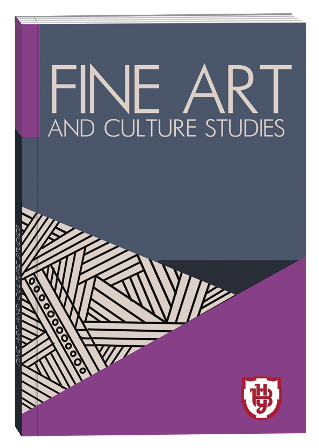THEORETICAL AND PRACTICAL PRINCIPLES OF WORKING WITH A STUDENT-VOCALIST OF POP SINGING
DOI:
https://doi.org/10.32782/facs-2022-4-6Keywords:
vocal position, support, articulation, singing, intonation, voice hygiene, stage art.Abstract
Pop art is one of the most socially widespread and mobile types of art. The study of this phenomenon helps to better understand the spiritual processes taking place in society. In this regard, in recent decades there has been an increased interest of researchers in this type of art: in its sources, history of formation, questions of theory and terminology, definition of its role and place in artistic culture, problems of professional training of specialists. The purpose of the article is to identify the professional foundations of the training of pop singers in institutions of higher education. The methodology of the work consists in the application of such methods as: empirical method, method of analogy, axiomatic method, elementary-theoretical method, method of systematization. The scientific novelty is to determine the theoretical foundations of the professional training of a pop singer, to highlight the criteria and basic principles of teaching pop singing, to characterize the basic principles of the educational process in working with student vocalists in institutions of higher education. To find out the methodological and pedagogical principles of the development of the skill of pop singers in institutions of higher education. To find out that the formation of a professional musician requires the integration of a lot of knowledge, abilities and skills, personal attributes into a complex structurally organized system. To reveal the practical principles of the professional training of pop vocalists in institutions of higher education, to consider the main methods and forms of organization of the educational process. To determine that in order to create the most favorable conditions for the development of musical abilities, aesthetic taste and professional growth of the student, a combination of different teaching methods is effective. As a conclusion, the article notes that the methodological and pedagogical principles of the skill development of pop singers need further professionalization. This will help solve the task of training a qualified pop artist and teacher in the formation of professional education in the field of pop music.
References
Алексюк А.М. Педагогіка вищої освіти України: Історія. Теорія : підручник для студентів, аспірантів та молодих викладачів вузів. Київ : Либідь, 1998. 557 с.
Андрущенко В.П. Основні тенденції розвитку вищої освіти України на рубежі століть(Спроба прогностичного аналізу). Вища освіта України. 2001. № 1. С. 11–17.
Антонюк В.Г. Постановка голосу : навчальний посібник для вищих музичних навчальних закладів. Київ : Українська ідея, 2000. 68 с.
Антонюк В.Г. Українська вокальна школа: етнокультурологічний аспект : монографія. Київ : Українська ідея, 2001. 144 с.
Бурська О.П. Виконавське осягнення музики Мистецтво і освіта. 2003. № 4. С. 24–29.
Буцяк В.І. Місце історико-стильового принципу в осягненні специфіки музичної культури. Українська культура: минуле, сучасність, шляхи розвитку. Наукові записки РДГУ. 2000. Вип. 5. С. 192–202.
Буцяк В.І. Стильова компетентність як складова професійної майстерності музиканта. Українська культура: минуле, сучасне, шляхи розвитку : зб. наук. праць. Наукові записки РДГУ. 2005. Вип. 10. С. 130−139.
Гавриленко Л.М. Сольний спів: програмні та методичні поради для ПСМНЗ. Хмельницький : ЦНТІ. 2008. 103 с.
Гребенюк Н.Є. Вокально-виконавська творчість: психолого-педагогічний та мистецтвознавчий аспекти. Національна музична академія України ім. П.І. Чайковського. Київ : НМАУ ім. П.І. Чайковського, 1999. 269 с.
Давидов М.А. Концепція музично-художньої виконавської технології. Часопис Національної музичної академії України імені П.І.Чайковського. 2010. № 2. С.68–91.
Дерев’янко Л.А. Спів у мовленнєвій позиції як проблема вокальної педагогіки. Таврійські студії. Мистецтвознавство. 2013. № 4. URL: http://nbuv.gov.ua/UJRN/tsm_2013_4_21 (дата звернення: 25.09.2022).
Катрич О.Т. Індивідуальний стиль музиканта-виконавця (теоретичні та естетичні аспекти) : автореф. дис. … канд. мистецтвознавства : 17.00.03. Київ, 2000. 17 с.
Линклэйтер К. Освобождение голоса. URL: http://teatrsemya.ru/lib/mast_akt/scen_rech/linklehjter_ k-osvobozhdenie_golosa-chast_1.pdf (дата звернення: 25.09.2022).
Попова А.Б. Система Крістін Лінклейтер та її роль у розвитку техніки естрадного вокалу. Вісник Національної академії керівних кадрів культури і мистецтв. 2018. № 4. С. 236–240.
Попова А.Б., Войченко О.М. Методика Сета Ріггза та її вплив на мистецтво естрадного співу. Імідж сучасного педагога. 2018. № 4(181). C. 62–64. URL: http://isp.poippo.pl.ua/article/view/ (дата звернення: 25.09.2022).
Прохорова Л.В. Українська естрадна вокальна школа: навчальний посібник для студентів вищих навчальних закладів культури і мистецтв ІІІ-IV рівнів акредитації. Вінниця : Нова книга, 2005. 103 с.
Прядко О.М. Розвиток співацького голосу : навчальний посібник. Кам’янець-Подільський : Сисин О.В., 2010. 128 с.
Чепеленко В.В. Основи мистецтва імпровізації : програма курсу та метод. рек. для освіт.-кваліфікац. рівнів «бакалавр» та «спеціаліст» / М-во культури і туризму України, Харків. держ. акад. культури, Ф-т муз. мистецтва, Каф. інструментів дух. та естрад. оркестрів / уклад. В.В. Чепеленко. Харків : [Б. в.], 2010. 28 с.
Шип С.В. Музична форма від звуку до стилю : навч. посіб. Київ : Заповіт, 1988. 368 с.







